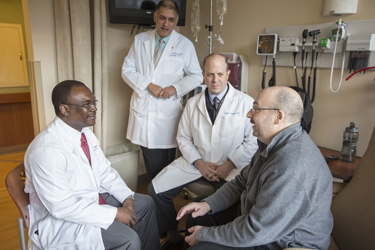For the first time, Vanderbilt-Ingram Cancer Center (VICC) investigators have used a cancer patient’s own re-engineered immune cells to treat a form of blood cancer by stimulating the immune system.
The new CAR-T investigational therapy is being tested in a clinical trial for patients with aggressive non-Hodgkin Lymphoma (NHL), a blood disorder in which malignant cells form in the lymph system.

NHL is one of the most common forms of cancer, with nearly 72,000 patients diagnosed every year in the United States.
VICC is the first cancer center in Tennessee to treat a patient with the new investigational technology. The Phase 1/Phase 2 trial, called ZUMA-1, is sponsored by Kite Pharma Inc. and is open to certain patients whose disease has progressed despite previous therapies.
“This is an ingenious way of using the immune system to treat cancer,” said Olalekan Oluwole, M.D., MBBS, MPH, principal investigator for the VICC trial. “The approach enables the patient’s immune system to more effectively recognize lymphoma and attack it in a way that’s similar to how the body’s immune system fights dangerous bacteria and viruses.”
Daniel Einstein, 55, a Nashville businessman and former music industry executive, was the initial patient treated in the trial. Einstein has been dealing with cancer since June 2012 when he woke up one morning with a swollen leg. A CT scan revealed substantial disease in his lymph nodes, diagnosed as stage 3 NHL. In hindsight, Einstein realized he had been feeling lethargic for several months.
“The initial diagnosis was scary and it hits you like a ton of bricks. The best thing you can do is keep a positive attitude, keep your head up and definitely keep a sense of humor,” Einstein said.
He was treated with seven previous chemotherapy regimens, but his aggressive form of NHL did not respond completely to the therapy. Eventually, Einstein sought treatment at VICC with Michael Savona, M.D., whom Einstein calls “my guiding light.”
After observing Einstein’s tumors grow after therapy, Savona, associate professor of Medicine and director of the Hematology Early Therapeutics Program at VICC, recommended a stem cell transplant using Einstein’s own cells. The tumors shrank, but less than six months later, in the spring of 2015, the cancer was active again.
This time, Savona recommended that Einstein consider the CAR-T immunotherapy.
Einstein and his wife, Ellen, wanted to know more about the CAR-T technology, so he recommended that they travel to Bethesda, Maryland, to meet with investigators doing initial research at the National Institutes of Health.
“To me, it’s very exciting. It makes so much sense, the way they’re doing this. Even taking the risks into account, it is something that is really promising,” Einstein said.
As part of the clinical trial, the patient’s own T-cells (a type of immune cell) are collected in an outpatient setting. The T-cells are sent to a special manufacturing facility where they are re-engineered to produce receptors on their surface called chimeric antigen receptors (CARs). These CAR proteins enable the T-cells to recognize a specific protein on tumor cells.
While the cells are being re-engineered, the patient undergoes several days of intense chemotherapy to subdue the body’s immune system. A few days later, the newly designed CAR-T cells (now called KTE-C19) are re-infused. They quickly multiply, begin circulating in the patient’s body and seek out the targeted tumor cells, causing the cancer cells to die. The patient is monitored in the hospital for several days to manage any side effects from the experimental therapy. The entire process takes about three weeks.
“The environment at Vanderbilt fosters a seamless, integrated approach among experts in hematological malignancies and stem cell transplant to offer these state-of-the-art therapies to potentially benefit patients and make scientific advances,” said Madan Jagasia, MBBS, M.S., co-Leader of the Translational Research and Interventional Oncology Research Program, director of the Outpatient Transplant Program, and section chief of Hematology and Stem Cell Transplant.
Savona said immunotherapy using re-engineered cells shows how powerful the immune system can be when targeted toward cancer.
“Cancer grows when it is able to, in essence, hide from immune surveillance. We are very excited about the promise of immunotherapy for patients with a variety of blood disorders, and the opportunity to first offer this to patients with refractory aggressive B-cell lymphoma, a disease with limited effective treatment options, is very gratifying,” Savona said.
Einstein has been released from the hospital and he said he’s slowly getting his strength back and will soon undergo scans to assess how the treatment is working.












